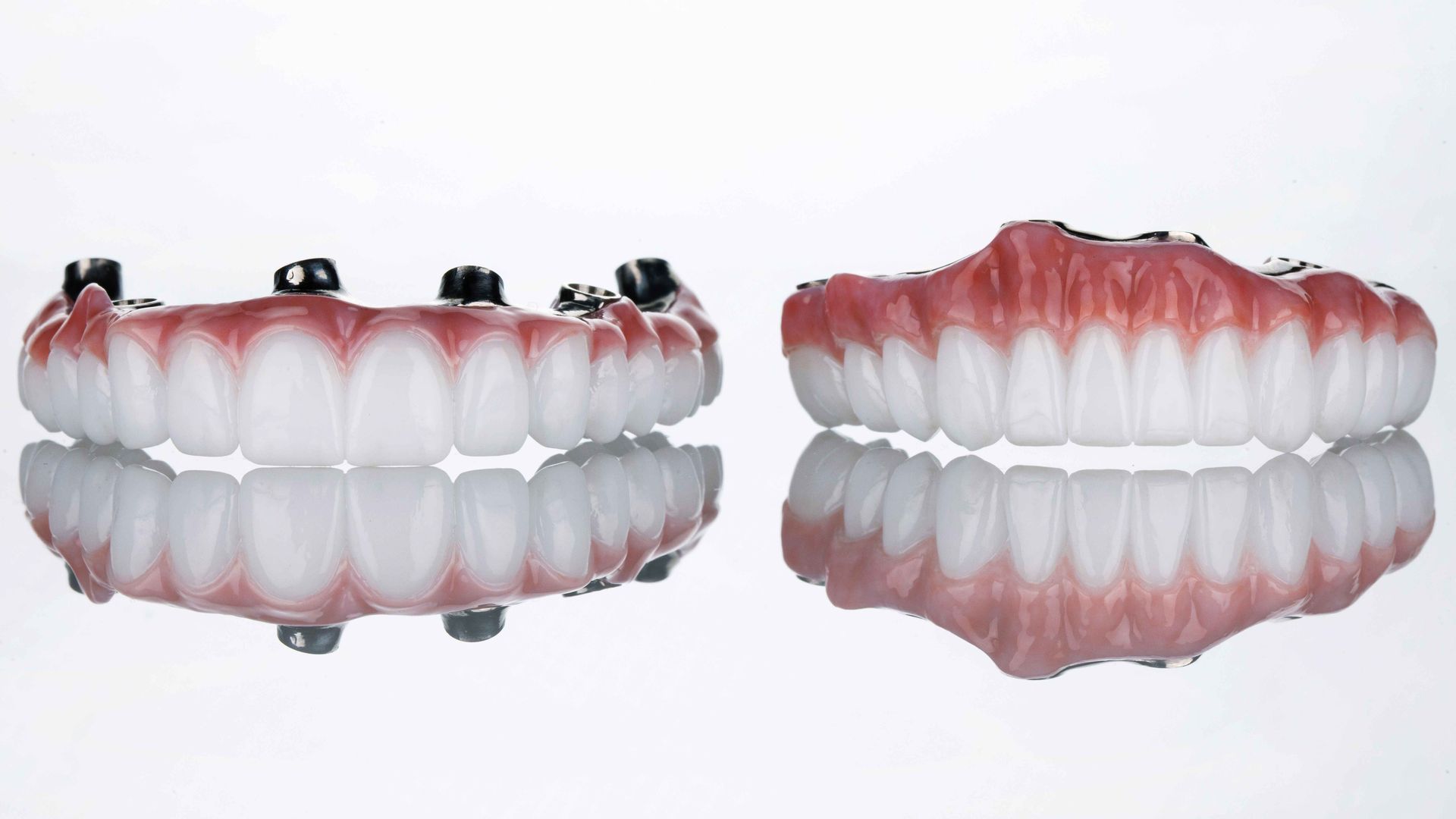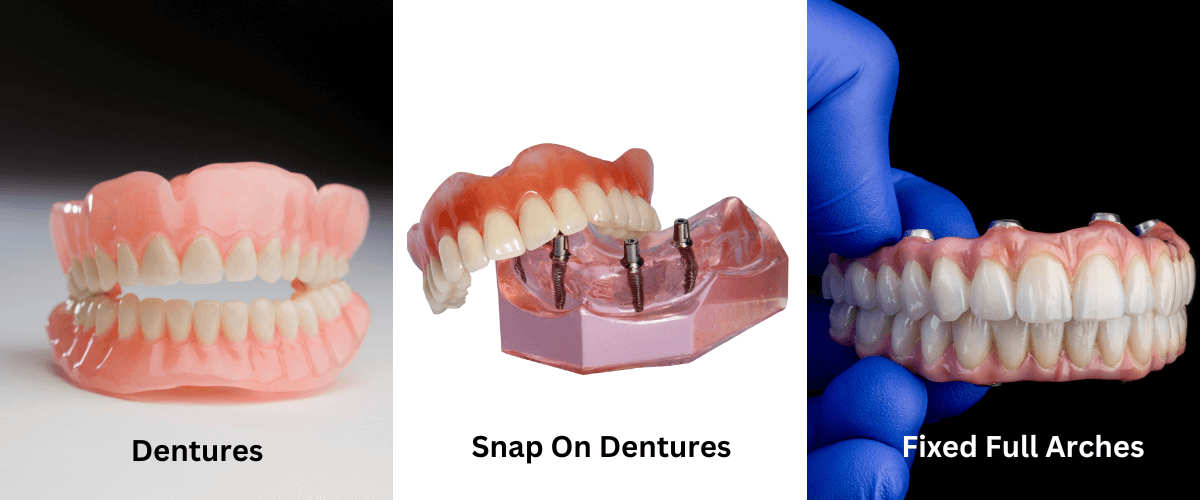Contact Information
smiles@mylakesidedentist.com
15400 19 Mile Rd, Clinton Twp, MI 48038, United States of America
Serving Clinton Township and Surrounding Areas
info@mylakesidedentist.com
(586) 228-0909
Tooth Implant vs Bridge: Find the Best Dental Option for You
13 Minute Read
Choosing between a tooth implant vs bridge can be overwhelming. This article will compare these options, covering their procedures, costs, and long-term benefits to help you find the best fit for your dental needs.
Key Takeaways
- Dental implants offer a durable, long-lasting solution for missing teeth, with a lifespan that can reach a lifetime, but involve a higher upfront cost and surgical procedures.
- Dental bridges are generally more affordable and quicker to install, but they may negatively impact adjacent teeth and require replacement every 5 to 15 years.
- Choosing between dental implants and bridges involves considering factors such as oral health, bone density, personal preferences, and long-term costs, making consultation with a dentist essential.
Understanding Dental Implants

Dental implants serve as artificial tooth roots crafted from titanium, specifically designed for the purpose of replacing missing teeth. They mimic the structure and function of natural teeth, providing a sturdy anchor for a tooth implant.
Here, we examine the procedure, benefits, and drawbacks of dental implants.
Procedure for Dental Implants
The dental implant procedure involves several steps, starting with the insertion of a metal post into the jawbone. This post acts as an artificial tooth root. Ideal candidates for dental implants are individuals in good overall health with a healthy jawbone. The process typically takes 5 months to a year to complete, allowing for recovery between each step.
Following the initial placement, a healing period of 2 to 6 months allows the bone to integrate with the implant. If there isn’t enough bone to support the implant, bone grafting may be necessary. Dental implants improve jawbone health and don’t rely on adjacent teeth for support.
Benefits of Dental Implants
Several advantages make dental implants stand out compared to other tooth replacement options. Their durability is a standout benefit; with proper care, they can last a lifetime. They also provide a natural appearance that closely resembles real teeth, enhancing the aesthetic appeal.
They also help preserve jawbone health. By preventing bone loss associated with missing teeth, dental implants maintain jawbone integrity. This not only supports oral health but also helps maintain facial structure.
Drawbacks of Dental Implants
However, dental implants do have some drawbacks. They typically have a higher upfront cost compared to dental bridges. The surgical procedure also carries risks, such as infection or implant failure. Additionally, patients may experience a longer healing time after the surgery, which can affect recovery and overall convenience.
These considerations are crucial when deciding if dental implants are the right choice.
Exploring Dental Bridges
Dental bridges are designed to fill gaps left by one or more missing tooth, using a dental crown on adjacent teeth and abutment teeth for support. They are replacing missing teeth using dental crowns for the anchoring teeth and false teeth (pontics) in between.
We’ll explore the various types of dental bridges and weigh their advantages and disadvantages.
Types of Dental Bridges

There are various types of dental bridges, each suited to different dental needs. Traditional dental bridges involve anchoring artificial teeth to adjacent healthy teeth. Cantilever dental bridges use two artificial teeth attached to one healthy tooth, with no support for the second tooth.
Other types include Maryland and implant-supported bridges, which use different anchoring methods. Maryland bridges consist of a metal or porcelain framework that is bonded to the back of the adjacent teeth, while implant-supported bridges are secured using dental implants for support.
Advantages of Dental Bridges
Several benefits come with dental bridges. Many patients prefer them over dental implants. One significant benefit is their quicker installation, as they do not require surgery. This convenience appeals to many patients.
Cost-wise, dental bridges generally present a more affordable option. Offering an effective, non-invasive solution for missing teeth, dental bridges are accessible to a broader range of patients.
Disadvantages of Dental Bridges
Yet, dental bridges come with their own set of drawbacks. They may negatively affect adjacent teeth, leading to decay and reducing their lifespan compared to implants. Supporting the bridge puts pressure on neighboring teeth, increasing the risk of decay.
Additionally, dental bridges typically have a shorter lifespan than implants, necessitating possible replacements sooner. These factors should be carefully weighed when considering dental bridges as a treatment option.
Comparing Durability and Lifespan
Understanding the durability and lifespan of dental implants and bridges is crucial when making a choice. Dental implants typically have a longer lifespan than dental bridges.
Here, we compare the longevity and maintenance requirements of both options.
Longevity of Dental Implants
With proper care, dental implants can last a lifetime. Maintenance includes routine brushing, flossing, and regular dental check-ups, with no special cleaning required. This makes them a low-maintenance, long-term solution for tooth replacement.
Although dental implants can last a lifetime, dental bridges often require replacement every 5 to 7 years. This significant difference in longevity is a major factor to consider when choosing between the two options.
Lifespan of Dental Bridges
Typically, dental bridges last between 5 and 15 years. Their lifespan can depend on various factors. The lifespan depends on the type of material used and individual oral hygiene practices. Bridges made from high-quality materials and maintained with good oral hygiene can last longer.
However, the need for potential replacements can increase the total expense over time. This aspect is important when evaluating the long-term costs and benefits of dental bridges.
Cost Analysis: Dental Implants vs Bridges
Cost plays a significant role in choosing between dental implants and bridges. Dental implants typically have a higher upfront cost than dental bridges.
Here, we’ll compare the initial costs and long-term value of both options.
Upfront Costs
Dental implants typically cost around $5,000, whereas dental bridges range from about $2,000 to over $5,000. The initial dental implants cost range for a single-tooth dental implant is typically $4,000 to $6,000. The higher initial cost stems from the complex procedures and potential bone grafting required.
Generally, dental bridges have a lower initial cost. This is because they require fewer specialized materials and no surgery. The cost range for dental bridges is approximately $1,500 to $3,000 per tooth.
Long-Term Value
Though cheaper initially, dental bridges often need replacement every 5-15 years. Potential replacements can increase the total expense over time. Thus, dental implants become a more cost-effective solution in the long run.
Most dental insurance plans do not cover implants, whereas many cover dental bridge treatments. Financing options for dental implants include dental savings plans, insurance, and third-party financing.
Health Considerations
Health considerations are vital when choosing between dental implants and bridges. Dental implants can help prevent bone loss, a common issue with missing teeth.
We’ll discuss their impact on jawbone health and effects on adjacent teeth and surrounding teeth.
Impact on Jawbone Health
Jawbone deterioration occurs when a tooth is lost and not replaced. Dental implants preserve jawbone health, preventing further dental issues. They prevent further bone deterioration and encourage the growth of new bone tissue, enhancing jawbone density.
Overall, dental implants halt bone loss, preserving the jawbone structure. In contrast, dental bridges do not prevent bone loss, causing a gradual decline in jawbone health.
Effects on Adjacent Teeth
Dental bridges may require altering adjacent teeth for support, potentially causing long-term dental issues. Using dental bridges can create pressure on adjacent teeth, increasing susceptibility to tooth decay and damage.
Bridges can strain adjacent structures over time, weakening them. Conversely, dental implants do not involve neighboring teeth, preserving their integrity.
Factors Influencing Your Decision
Lifestyle, medical history, and financial considerations influence the decision between dental implants and bridges. We’ll cover these factors in detail.
Oral Health and Bone Density
Healthy bone density is crucial for the success of dental implants. Candidates for dental implants need adequate jawbone density for secure support. Bone grafting may be necessary if there isn’t enough bone.
Dental implants stimulate the jawbone, helping to prevent bone loss after tooth loss. This stimulation is vital for preserving jawbone health.
Personal Preferences and Lifestyle
Cost often significantly influences personal preferences when considering dental options. Dental implants usually have higher upfront costs than bridges, requiring careful financial consideration.
Although dental implants have a higher initial cost, their longevity and durability offer greater long-term value, affecting lifestyle and financial planning. Consulting a dentist is crucial for making an informed decision that aligns with health needs and lifestyle choices.
Consultation with Your Dentist

It’s crucial to consult your dentist when deciding between dental implants and bridges. A dentist can provide personalized advice and create a treatment plan tailored to your needs. Periodontists can also guide you in making informed decisions about dental treatment options.
Consulting dental professionals can lead to better treatment outcomes and satisfaction.
Summary
In conclusion, both dental implants and bridges offer effective solutions for replacing missing teeth. Dental implants provide a long-lasting, durable option that preserves jawbone health and doesn’t affect adjacent teeth. On the other hand, dental bridges are a quicker, lower-cost solution but may have a shorter lifespan and impact surrounding teeth. Consulting with your dentist and considering your health, lifestyle, and financial situation will help you make the best choice for your dental needs.
Frequently Asked Questions
-
What are the main differences between dental implants and bridges?
The main difference lies in their structure and longevity: dental implants are artificial roots placed into the jawbone, promoting long-term jaw health, whereas bridges utilize crowns on nearby teeth to replace gaps, often being less invasive and more cost-effective initially. Ultimately, implants offer greater durability and health benefits over time.
-
How long does the dental implant procedure take?
The dental implant procedure can take between 5 months to a year, accounting for recovery time between each stage. It is essential to follow your dentist's guidance for optimal results.
-
Are dental bridges covered by insurance?
Dental bridges are often covered by dental insurance, whereas dental implants typically are not covered. It's advisable to check your specific insurance policy for details.
-
Do dental implants require special care?
Dental implants do not require special care; routine brushing, flossing, and regular dental check-ups will maintain their health effectively.
-
Can dental bridges affect neighboring teeth?
Yes, dental bridges can affect neighboring teeth by placing pressure on them, which may lead to an increased risk of decay and damage over time.








CONTACT US FOR A FREE CONSULTATION
Ready to Take the Next Step Towards a Full, Vibrant smile?
Start your journey towards exceptional dental care. Our mission is to help you unlock your perfect smile and embrace the essence of quality dentistry at its finest.

Contact Information
Request a Free Consultation
For more information about our services or to schedule an appointment, call us at (586) 228-0909 or complete the form below we’ll get back to you as soon as we can.
Our Services
Quick Links
Contact Information
smiles@mylakesidedentist.com
15400 19 Mile Rd Suite 180
Clinton Township, MI 48038
All Rights Reserved | Lakeside Family & Implant Dentistry







